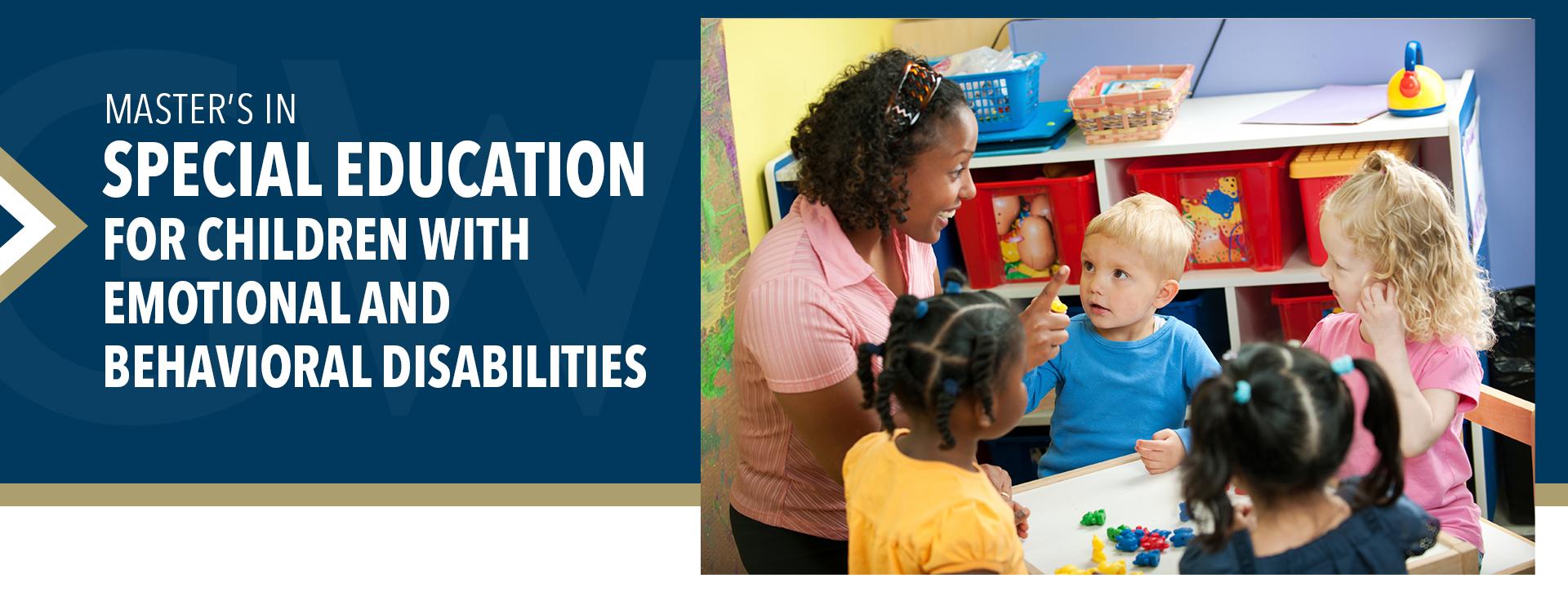Master's in Special Education for Children with Emotional and Behavioral Disorders
Become an Advocate for Positive Change
Graduate students in the Special Education for Children with Emotional and Behavioral Disabilities (EBD) program gain the knowledge and skills necessary to become highly qualified special educators working with a diverse population of students with learning, emotional, and behavioral challenges.
Graduates of the program will be eligible for teacher licensure in K-12 Special Education - Emotional Disturbance (ED), Learning Disability (LD), and Intellectual Disabilities (ID).
A Professional Development School (PDS) model is emphasized in the program, blending theory and practice of learning to teach, so that concepts learned in a university classroom can be applied the next day to work with students with challenging behaviors in their full-time, clinical internship in a therapeutic school setting. Read more about the role of a special education professional in meeting the needs of every learner >
Nationally Recognized & Accredited
With 20+ years of experience training exemplary educators, the EBD program is nationally recognized by the Council for Exceptional Children and accredited by Council for the Accreditation of Educator Preparation (CAEP).
Accommodating
Classes are offered in the evenings to accommodate working professionals and for internship experiences. Program can be completed as a part-time or full-time student.
Leading Faculty
Faculty are experts in developmental and educational psychology, behavioral interventions, and special education. They are nationally recognized educators and clinicians with experience leading innovative work in research and practice across education and health sectors.
The GW Advantage
Unique to the the DC, Maryland, Virginia (DMV) area, our location gives students access to urban or suburban; public, charter, or private schools. This allows students to examine, compare, and contrast schools with widely different student populations, structures, and demographics.
Students complete a two-semester clinical internship at a regional partner school or at their place of employment. University faculty and staff provide supervision and individualized feedback on the teaching process as well as weekly seminars that provide a forum for professional growth and peer-driven emotional support.
Degree Awarded:
Master of Arts in Education and Human Development in the Field of Special Education for Children with Emotional and Behavioral Disabilities
Department:
Special Education and Disability Studies
Course Delivery:
Hybrid
(Foggy Bottom Campus + Online Courses)
Program Entry:
Spring, Summer, Fall
- Our Mission
The mission of the Programs for Teaching Students with Emotional and Behavioral Disabilities (EBD) is first and foremost to prepare psychoeducators of the highest caliber. While this may seem to be a simplistic and generic training statement, we are committed to an organized framework of beliefs that we feel exemplify best practice.
The mission is a difficult one in the face of the challenges in today’s schools. The continuum of behaviors that students present can range from externalized explosions to internalized silence. Our program emphasizes a therapeutic approach to develop sensitivity to the complex issues concerning students who present many conflicts within themselves, their families, and society.
Our mission also guides our dedication to embracing diversity among our graduate student population. We believe that age, gender, culture, race, sexual orientation, and ethnic differences among our graduate students enhance learning.
Finally, our mission encourages research, scholarship, and leadership activities so that graduates become advocates for this population beyond the school.- Curriculum Requirements
The following requirements must be fulfilled: 36 credits in required courses, successful completion of the master of arts in education and human development comprehensive examination, and completion of the relevant teacher licensure assessments (see below).
Code Title Required SPED 6200 Foundations of Reading Instruction SPED 6201 Overview of Legal Issues in Educating Students with Disabilities SPED 6202 Researching Current Trends in Special Education SPED 6203 Research and Practice of Diagnostic Reading for Students with Disabilities SPED 6204 Analysis of Personalized Teaching for Professionals Working with Students with Disabilities SPED 6233 Culturally Responsive Curriculum in Special Education SPED 6238 Issues in Educating Individuals with Learning, Emotional, and Intellectual Disabilities SPED 6260 Developmental Assessment in Special Education SPED 6288 Understanding the Characteristics and Needs of Students with Disabilities SPED 6290 Affective Development and Behavior Management for Teaching Students with Disabilities SPED 6990 Practicum in Teaching Students with Disabilities SPED 6991 Internship in Teaching Students with Disabilities Additional Requirements: Successful completion of the master of arts in education and human development comprehensive examination. Completion of the relevant teacher licensure assessments (i.e., PRAXIS) required by the District of Columbia Educator Licensure Services Office - Program Outcomes
Graduates of the program will be eligible for teacher licensure in K-12 Special Education - Noncategorical, Emotional Disturbance (ED), Learning Disabilities (LD), and Intellectual Disabilities (ID).
Students will learn to:
- Provide focused strength-based instruction and individualized interventions to support students' learning and behavioral challenges.
- Use research-based strategies to support students’ academic and socio-emotional growth.
- Be strong advocates for the students and families they serve.
Apply Now
Applications are not currently being accepted for this program. We invite you to explore our other Special Education & Disability Studies programs.
For more information or to inquire about other programs, contact the GSEHD Admissions Team at teachinfo![]() gwu [dot] edu (teachinfo[at]gwu[dot]edu) or 202-994-9283.
gwu [dot] edu (teachinfo[at]gwu[dot]edu) or 202-994-9283.
To be considered for admission, applicants must submit the online application form as well as the following required supporting documents. There is no application fee.
- Prerequisite: Bachelor's Degree
- Resume
- Transcripts from all previously attended colleges or universities
- Statement of Purpose
- One Letter of Recommendation
*Due to the format of the program, international students are not eligible to attend this program on a student visa. Please consider the online Master's in Special Education. If you have questions, please contact education
 gwu [dot] edu (education[at]gwu[dot]edu).
gwu [dot] edu (education[at]gwu[dot]edu).
Tuition & Financial Aid
We know embarking upon graduate school is a big decision - due in part to the costs of attending. At GW, we understand the time and thought behind making graduate school work for you. Please take a moment to learn more about the options and opportunities available to help fund your graduate education.
Graduate tuition is charged per credit hour, unless otherwise noted. Rates vary by program and location.
The tuition rate* for the Master's in Special Education EBD program is $1,270 per credit hour.
This program requires 36 credits.
Please note: Additional fees may apply for international students, late fees, etc. Current tuition rates may be updated during the year.
*Summer 2025, Fall 2025 and Spring 2026
Scholarships are available to eligible admitted students. Review eligibility requirements and learn more about funding your education >
My experience at GSEHD has deepened my understanding of how to teach the whole child. I can immediately apply strategies from my professors in my current classroom of 9th and 11th graders. Our professors are kind, loving, and understanding.
BENEKA MEGGINSON ('23)
Master's in Special Education for Children with EBD
Career Outlook
Graduates of this program are highly sought after for post-program employment, as well as demonstrate teacher-retention rates many times higher than the national average.
- Special Education Career Opportunities
-
In addition to becoming highly effective Special Education Teachers, our graduates are prepared to take on other critical roles in the education of students with disabilities, including:
- K-12 Special Education Teachers
- IEP Team Leaders/Coordinators
- Behavior Specialists
- Educational Consultants
- Potential Employment Settings
-
Graduates are prepared to work with children in multiple K-12 settings including:
- Inclusive Classrooms in Public, Charter, and Private Schools
- Self- Contained Classrooms
- Alternative or Nonpublic Schools
- Tutoring Companies
- Educational Consulting Companies




Department Chair and Associate Professor, Special Education and Disability Studies






